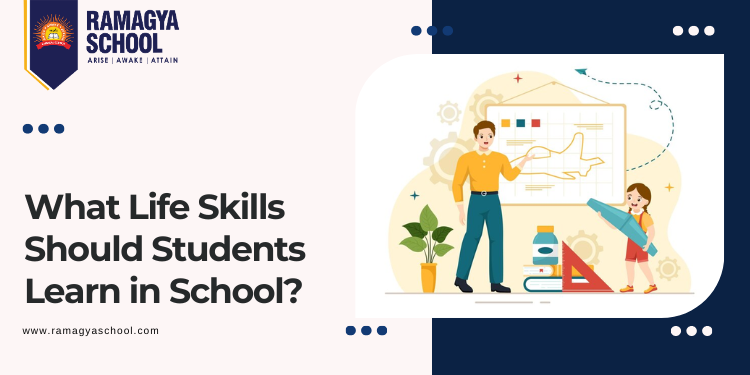In this fast-paced world students require more than just academic skills to be successful. They require skills that can allow them to tackle real-world problems. These are known as life skills, and are as crucial as subjects such as math and science, or history. However, many schools concentrate heavily on academic subjects and do not pay enough attention to life-skills education.
This blog will discuss why life skills for children should be an essential part of the school curriculum and what specific life skills students should learn.
The Importance of Life Skills in Education
Life skills education are those abilities that we require to handle daily tasks with ease. They include abilities like communication, problem-solving, decision-making, emotional control, as well as time management. The importance of life skills in education is growing as students face an increasingly complex world. These skills help students in growing to become responsible individuals who contribute to society.
Life Skills education goes beyond the preparation of students for exams. It helps prepare them for their future. When children learn life skills from the age of 5 they are more self-confident. They also get better in managing stress, forming relationships, and making wise choices. The earlier they acquire these abilities, the better prepared they will be to deal with adulthood.
Key Life Skills for Children
1. Communication Skills
One of the most important life skills for children is communication. The ability to communicate thoughts and ideas in a clear manner is vital, whether writing, speaking and even non-verbal expressions such as body language. Effective communication can help students establish connections, work in teams and settle conflict. Group discussions, role-playing, and presentations are all helpful in enhancing communication skills.
2. Decision-Making and Problem-Solving
There are a lot of possibilities, and being able to make the right choices is a crucial life skill. Problem-solving and decision-making are essential abilities for children that help children to weigh the advantages and disadvantages of a scenario before deciding the most appropriate solution. Schools can train students to approach problems with a methodical approach and think about different options, and about their options. For example, students who excel in problem-solving are better able to handle stress from peers as well as other problems they will face in their teens.
3. Emotional Management
Learning to manage emotions is an additional aspect of life-skills education. Students who are able to manage emotions such as anger and sadness are better able to handle anxiety. Schools must teach children how to recognize their feelings and respond to them in a manner that is appropriate. Methods such as meditation, mindfulness of breathing exercises can assist children to get their minds back in order when they are overwhelmed. The ability to be emotionally intelligent, which includes the ability to recognize and manage emotions in your own and in others is crucial to establishing strong relationships and living a healthy life.
4. Time Management
Time management is an important life skill for children, particularly as they progress through the school system and assume more responsibility. Being able to prioritize tasks, and to efficiently manage time can ease stress and boost productivity. Schools can aid by introducing methods like making timelines, setting deadlines and breaking down tasks into smaller steps. The early introduction of time management will prepare students for challenges to come in their professional and personal life.
5. Financial Literacy
Financial literacy is a vital ability that is often left unnoticed in the classroom, yet it’s vital. Knowing how to manage your budget, saving and budgeting your money well can help prevent financial difficulties as we age. Schools should be able to introduce fundamental concepts of finance to children including how to handle accounts at the bank and how important it is to save and the dangers of taking on borrowing. Financial literacy can help students establish a positive relationship with money that will enable them to make financially sound decisions as they get older.
Why Schools Must Focus on Life Skill Education
The importance of life skills education cannot be overstated. Life skills for children help them become well-rounded individuals who are prepared for the challenges of adulthood. Many adults have difficulty with issues such as dealing with finances, resolving conflicts and coping with pressure due to the fact that they didn’t learn these skills at school. By integrating life-skills education in the curriculum, schools can help fill the gap.
In addition, life-skill education improves academic performance. If students are able handle their time and workload, manage stress and manage their time effectively then they will be more successful in the classroom. Life skills can also help improve mental well-being. If children are taught how to manage their emotions and deal with issues and problems, children are more likely to be overwhelmed by the pressures of school or social pressures.
How Ramagya School Instills Life Skills in Children
Ramagya School places a strong focus on life-skills education, making sure that students are prepared to face the real-world issues. The school integrates programs that encourage the ability to communicate, make decisions, emotional intelligence, time management into its daily program. Through engaging lessons with group projects, as well as mindfulness exercises, students acquire vital life skills that children need such as problem-solving, emotional control, and self-control. Ramagya’s method encourages personal development as well as responsibility, resilience and helps students become confident, self-assured individuals who are well-prepared to succeed academically and the challenges that come with life after school.
Conclusion
Life learning is a crucial element of helping children achieve throughout their lives, not just in the classroom. It is important to have life skills in the classroom and must not be ignored and it’s an ideal time for the schools to give these lessons a higher priority to help students prepare for a successful future.
If students are taught the necessary life skills, they will succeed academically as well as personally and lead a more fulfilled and well-balanced life.





